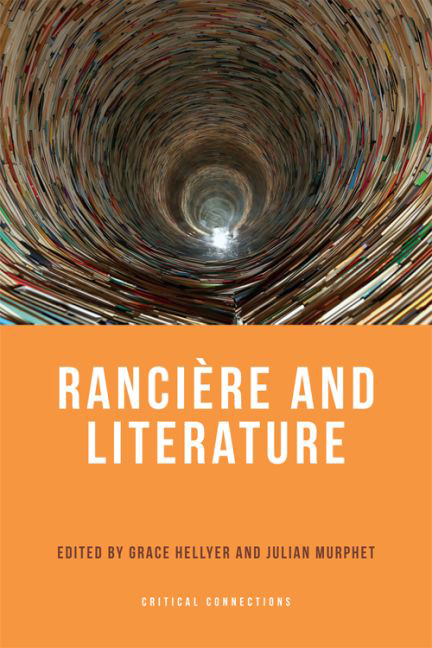Book contents
- Frontmatter
- Contents
- Acknowledgements
- Notes on Contributors
- Introduction: Rancière and Literature
- SECTION I Coordinates
- SECTION II Realisms
- SECTION III Contemporaneities
- 10 Ineluctable Modality of the Sensible: Poverty and Form in Ulysses
- 11 The Politics of Realism in Rancière and Houellebecq
- 12 Literature, Politics and Action
- Index
11 - The Politics of Realism in Rancière and Houellebecq
from SECTION III - Contemporaneities
Published online by Cambridge University Press: 15 September 2017
- Frontmatter
- Contents
- Acknowledgements
- Notes on Contributors
- Introduction: Rancière and Literature
- SECTION I Coordinates
- SECTION II Realisms
- SECTION III Contemporaneities
- 10 Ineluctable Modality of the Sensible: Poverty and Form in Ulysses
- 11 The Politics of Realism in Rancière and Houellebecq
- 12 Literature, Politics and Action
- Index
Summary
This chapter engages with Jacques Rancière's theorisation of the politics of literature and the central role that nineteenth-century French literary realism plays in it. In a first section, I assess Rancière's politics of literature from a perspective that nuances Rancière's theory of realism as democratising and equalising and considers in addition the modern novel's potential complicity with what Michel Foucault calls ‘biopolitics’. This will enable me to distinguish what I call Rancière's ‘performative realism’ from approaches to realism that stay within the representationalist framework that he largely leaves aside. I then consider Rancière's discussion of nineteenth-century workers and workers’ thought, showing how it puts his performative realism into practice. In the second half of the chapter, I mobilise this theoretical framework to make sense of contemporary French novelist Michel Houellebecq's struggle with realism and the representation of contemporary workers in his novels Whatever and The Map and the Territory. Taking my cue from Houellebecq's realism, I consider in closing what I claim to be the neglected object-oriented dimension of Rancière's politics of literature, arguing that while this dimension is essential to Rancière's discussion of literary realism, it marks a limitation of his humanising politics. At the limit of his politics but crucial to his politics of literature, then, this dimension draws out the tension between ‘politics’ and ‘the politics of literature’ that this chapter ultimately reveals.
Literature about anything, for anyone
Rancière's theorisation of the politics of literature, and of the politics of nineteenth-century French literally realism in particular, has taken many by surprise due to its stubborn refusal to assess realism within debates about its representationalism, or its aim to give an account of the world. In his work on realism, Rancière proposes that the politics of realism cannot be assessed on this count. By extension, critics of realism cannot simply claim anti-representationalism – ‘realism will never be able to give an account of the world’ – as a political position.
- Type
- Chapter
- Information
- Rancière and Literature , pp. 226 - 248Publisher: Edinburgh University PressPrint publication year: 2016

